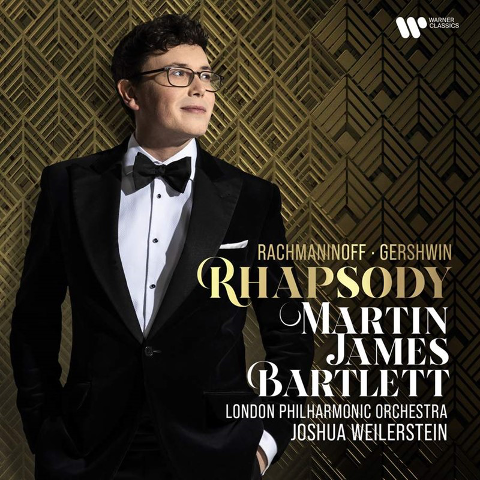Rachmaninov – Gershwin Rhapsody
Harmonious Rhapsodies: Martin James Bartlett and the London Philharmonic Orchestra
April 2022
Martin James Bartlett’s “Rhapsody” is a captivating album that showcases his exceptional talent as a pianist, along with the London Philharmonic Orchestra’s musical prowess. The album revolves around the theme of Rhapsody and explores the works of two great composers, Rachmaninoff and Gershwin, both of whom share intriguing commonalities in their compositions.
The first part of the album features Rachmaninoff’s “Rhapsody on a Theme of Paganini,” a work known for its unforgettable lyricism and structural treatment. Bartlett’s interpretation shines in the A minor section, where his crisp articulation and lively staccatos bring a vibrant vivacity to the music. The interplay between the piano and the orchestra is well-executed, but at times, the bassoon’s importance could have been emphasized more, and Bartlett’s phrases could benefit from added color. Comparisons with other performances, such as Trifonov’s version with the Philadelphia Orchestra, show slight differences in instrumental balance and dynamic gradients, but Bartlett’s rendition still impresses with its lyricism.
The middle sections of the Rhapsody introduce various vibrant personalities, and Bartlett navigates them skillfully. The brass section of the London Philharmonic adds oomph to Variation 14, and Bartlett’s runs in Variation 15 are noteworthy for their mellow tone and playfulness. However, in the iconic D-flat major variation (Var. 18), where sensitivity and a long-term buildup are essential, Bartlett’s interpretation is beautiful but lacks the desired fullness in sound. Other performances, like Abduraimov and the Lucerne Symphony, offer a more organic fluidity to the lines, making them preferred choices for some listeners.
The second part of the album features Gershwin’s “Rhapsody in Blue,” presented in the symphonic scoring by Ferdé Grofe, who premiered it with Toscanini and the NBC Symphony in 1942. Bartlett’s version captures the essence of the piece, but the clarinet solo disappoints due to its quick glissando and a slower tempo, missing the slinky jazz vibe. Benny Goodman’s version on the Toscanini/Wild recording excels in capturing the work’s energy, with a longer-than-usual trill and a perfectly executed glissando. While Bartlett’s performance is smooth and suave, it lacks some of the boisterousness, humor, and fun that make the piece truly enthralling. However, the finale is done justice, with Bartlett and the orchestra delivering a sweeping reprisal of the main theme.
The album includes solo works by Earl Wild, whose connections to both Rachmaninoff and Gershwin are evident. Bartlett’s rendition of Wild’s Etude No. 4 after ‘Embraceable You’ is a high point, displaying his technical prowess and providing a soothing and romantic experience. The melodic continuity, warmth, and vocal quality in Bartlett’s interpretation create a captivating atmosphere, and the passionate and radiant high point showcase his virtuosity.
The liner notes offer concise introductions to the works, focusing on the connection between the composers and the thematic basis of the album. The sound engineering is generally good, though it can feel a little up-close at times. Nevertheless, this allows listeners to catch subtle textural details that enrich the performances.
“Rhapsody” by Martin James Bartlett and the London Philharmonic Orchestra is an enjoyable and well-executed album. Bartlett’s pianistic brilliance and the orchestra’s skillful support make this recording a must-listen for lovers of Rachmaninoff, Gershwin, and virtuosic piano music. While there are minor areas for improvement, the overall solid performances and the choice of compelling works make this album a delightful addition to any classical music collection.

